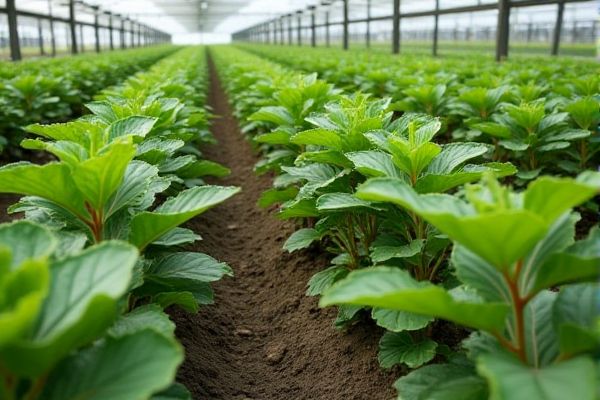
The horticulture industry in the Philippines offers a variety of job opportunities, ranging from plant propagation to landscape design. Positions include horticulturists, landscape architects, and greenhouse managers, catering to a growing demand for sustainable gardening and landscaping solutions. Research and consultancy roles focus on crop improvement and pest management, contributing to food security and agricultural sustainability. Agricultural cooperatives and NGOs frequently seek skilled professionals to promote organic farming practices and enhance community-based gardening initiatives.
Job Description
Horticulture jobs in the Philippines involve a variety of roles centered around the cultivation of plants, fruits, and vegetables. Positions may include plant propagation, landscape maintenance, and pest management, often requiring an understanding of local agricultural practices. You may work on urban farms, research institutions, or agricultural companies that prioritize sustainability. Opportunities exist for both entry-level workers and experienced professionals, making the field dynamic and accessible.
Requirement
Horticulture jobs in the Philippines typically require a background in agriculture or related fields, with a degree or diploma often preferred. Practical experience in plant cultivation, pest management, and soil science can greatly enhance your employability in this sector. Familiarity with local flora, sustainable farming practices, and environmental regulations is essential for keeping up with industry standards. Strong communication skills and the ability to work in teams are also valuable traits that employers seek in candidates for horticulture positions.
Salary and Perks Expected
Horticulture jobs in the Philippines offer competitive salaries that vary based on experience, location, and the specific sector within the field. Entry-level positions may start around PHP 15,000 to PHP 20,000 per month, while more experienced professionals can earn between PHP 30,000 to PHP 50,000 or more in specialized roles. Besides the salary, many jobs in horticulture include benefits such as health insurance, opportunities for professional development, and possible bonuses during peak seasons. Engaging in this sector not only allows you to work with plants and nature but also contributes positively to the agricultural landscape of the country.
Similar Job Names
- Horticulturist
- Landscape Designer
- Plant Nursery Manager
- Agricultural Extension Worker
- Greenhouse Technician
- Floriculturist
- Arborist
- Turf Management Specialist
- Pest Control Advisor
- Soil Scientist
- Plant Pathologist
- Urban Farmer
- Garden Center Retail Manager
- Horticultural Research Scientist
- Landscape Architect
- Agricultural Consultant
- Orchid Specialist
- Fruit Production Technician
- Horticultural Therapist
- Organic Farm Manager
Job Expectation Concept
Horticulture jobs in the Philippines encompass various roles, including landscape design, plant propagation, and agricultural management. These positions require a deep understanding of local flora and environmental conditions, making knowledge of native plants and sustainable practices crucial. Opportunities exist in both the private sector, such as landscaping companies and nurseries, and public sectors like government agricultural programs. By developing skills in horticultural science and staying updated on trends, you can enhance your employability in this growing field.
Career Advantage and Weakness
Horticulture jobs in the Philippines present ample career advantages, including a growing demand for skilled workers in agriculture and landscaping due to the country's rich biodiversity and favorable climate. Opportunities for specialization in areas like organic farming, landscape design, and floriculture allow you to develop specific skills that can enhance employability and career growth. However, challenges exist, such as fluctuating market prices for produce and limited access to advanced agricultural technology, which can impact job stability. Understanding these dynamics is essential for navigating a successful career in the horticulture sector.
Important Thing Must Know
Horticulture jobs in the Philippines encompass a variety of roles, from plant cultivation to landscape design. The country's diverse climate allows for the growth of numerous tropical plants, making it an ideal location for horticulturalists. Opportunities exist in both public and private sectors, including agricultural research, nursery management, and landscape architecture. Government initiatives often promote sustainable practices, enhancing job prospects in eco-friendly horticulture. Gaining experience through internships or volunteer programs can significantly boost your employability in this vibrant industry.
Alternative Career Options
The horticulture sector in the Philippines offers various alternative career paths beyond traditional gardening roles. You might explore opportunities in landscape design, where creativity meets environmentally friendly practices to enhance outdoor spaces. Another option is agricultural extension work, which involves educating farmers and communities about sustainable horticultural practices. Additionally, positions in research and development focus on improving crop varieties and pest management strategies, contributing to the nation's agricultural advancement.
Companies List
- Centro de Servicios en Horticultura, Inc.
- Philippine Horticultural Society
- Philippine Coconut Authority
- East-West Seed Company
- University of the Philippines Los Banos - College of Agriculture and Food Science
- Green Solutions Agribusiness
- San Miguel Foods, Inc.
- Dole Philippines, Inc.
- Del Monte Philippines, Inc.
- Agriya Corporation
List of Ideal City
Quezon City is a vibrant hub that offers numerous horticulture job opportunities, thanks to its expanding urban gardens and agricultural projects. Davao City boasts a rich agricultural landscape, providing ample prospects in landscaping, plant cultivation, and environmental management. Bacolod, known as the "City of Smiles," has a growing demand for horticultural experts as it enhances its green spaces and community gardens. Cebu City combines urban development with a focus on sustainability, making it an attractive location for those looking to pursue a career in horticulture.
 jobs-philippines.com
jobs-philippines.com